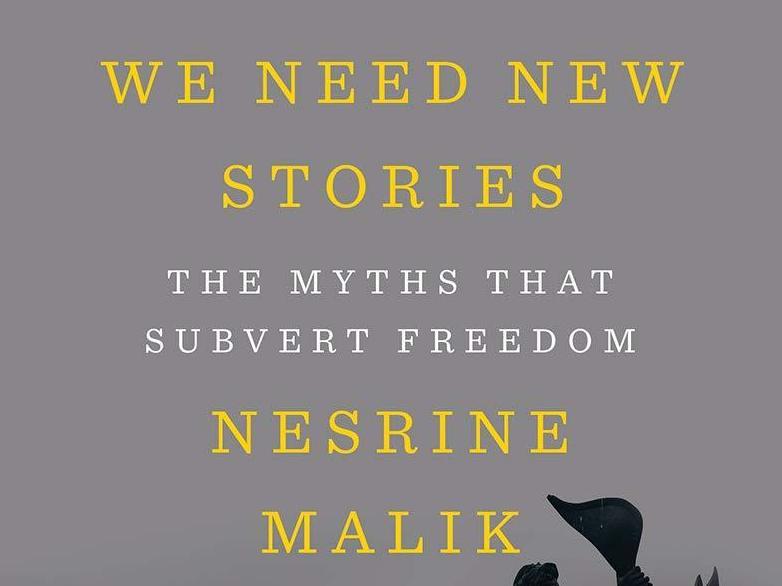Section Branding
Header Content
'We Need New Stories' Asks: Why Are People Prone To Believing The Largest Of Lies?
Primary Content
"Throughout my childhood I was fed this ancestral myth that still remains fixed for many of my generation of Maliks. It is sort of a private family madness," Nesrine Malik writes in the introduction to her debut book, We Need New Stories.
She's speaking of a bit of family folklore that has been passed down from generation to generation: The notion that in their homeland of Sudan, a forebear owned a house that was so large, tea would grow cold while one walked from one side of it to the other. When she learned how false and fanciful this narrative was — members of her family in Khartoum were so poor that many slept in the yard outside their overcrowded house — she felt betrayed.
Her childhood disillusionment forms the compelling and much-needed emotional core of We Need New Stories. Written in the aftermath of Donald Trump's Electoral College win in 2016, the book is framed by the former president's myriad blunt dishonesties. There's nothing crafty or complicated about any of Trump's individual mistruths, the book points out; it's only when they're woven together that they become systemically insidious.
As Malik expertly explains, story is the sin. Like any other weapon, narrative can and has been used for both good and evil throughout eons of human civilization. Today, though, the recognition of how we tell stories — and to whom — is central to understanding the battle that progressives are truly waging.
We Need New Stories, to its benefit, doesn't begin and end with Trump. While he and his populist, ad hoc movement are very much the oxygen that enflame Malik's activist outrage and academic curiosity, her book ranges more widely. It's split into six sections, each of which tackles a single, urgent topic, from feminism to free speech to Black Lives Matter. She astutely lays out her argument: that the twisting of stories and negation of facts by the right is only nominally ideological, if at all. These practices are pragmatic; money and power usually lie at the heart of such scheming, and Trump's rampant, transparent deceit is only the apotheosis of American's long history of the grift. She's reclaiming the terms of defense against ignorance and bigotry, ones that have become rote in the mouths of some and insults in the mouths of others: phrases such as trigger warnings, virtue signaling, safe spaces, cancel culture and the whopper of them all, political correctness. Many efforts have been made over the past few years either to pillory or justify the thoughts and feelings behind such reductive jargon. Malik breaks down these complex dynamics with efficiency — but also wit, charm and warmth.
Why are people prone to believing the largest of lies? Their largeness, Malik shows, is often the reason. Lies knitted into narratives are often so overwhelming — especially in an age of social media and its manipulation —that it's easier to smother oneself with them. In the hands of a lesser writer, such analysis would be preachy or dry. But Malik's tone is both conversational and crystalline, and her plain-spoken yet authoritative tone stirs rather than browbeats. Even when she's aiming the reader inward by probing the pitfalls of self-denial and self-delusion, she doesn't come across as didactic. At the same time, she subtly conveys the idea that the problems of identity politics can tend to stem from personal identity; acknowledging that power is a big step toward enacting external chance from within.
The paradox Malik points out in her introduction to We Need New Stories is a profound one. By unashamedly spinning yarns to ourselves and our communities — either familial, social or political — we're able to protect ourselves from harsh truths simultaneously while harming those who feel duped when those harsh truths are discovered. She's pointing fingers, for sure, but she's not categorically condemning any one group of people — unless, of course, you count those individuals who willingly pervert not only the stories that inform our civic discourse, but the very sacred and essential human need for storytelling itself. "The strength of myths is not in facts, but in the narrative," Malik sums up. "It's important that we also stake our claim to stories." In her measured yet passionate voice, these statements aren't simply observations. They're rallying cries.
Jason Heller is a Hugo Award-winning editor and author of Strange Stars: David Bowie, Pop Music, and the Decade Sci-Fi Exploded.
Copyright 2021 NPR. To see more, visit https://www.npr.org.
Bottom Content




